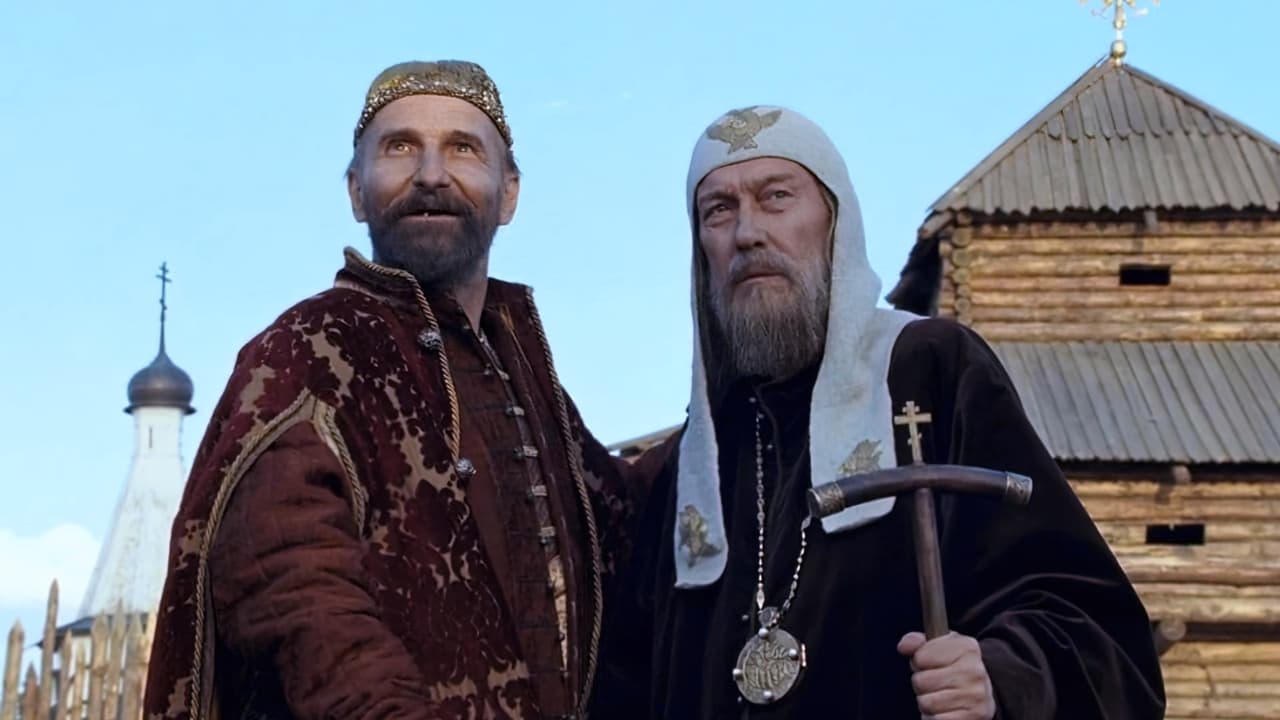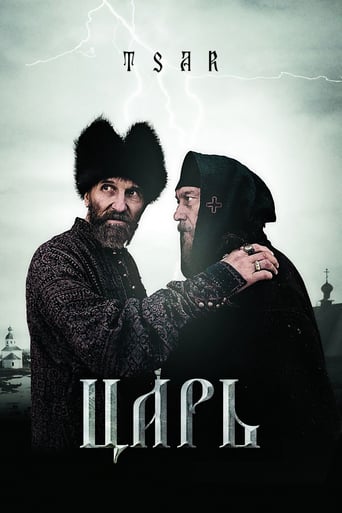

more than a film. it is a form of visual essay about power and religion, about solitude and about the roots, laws and vision of tyranny. it is a fight against Russia's history. a parable. portrait not of Ivan Vasilievich but for a manner, an usual manner of East to use the authority with high force and profound fear. Pyotr Mamonov gives a strange, cold, unpredictable, vulnerable Ivan. a Tsar looking for himself, lost in good intentions and noble projects. but, maybe, the hero is Philip. the voice of Church and good sense. the voice of conscience in a dark circle of confusion. the Metropolit is a splendid role. the last for great Oleg Ynkovsky and that status impose a special status to it. more than a film. maybe, useful subject for reflection. about power. in our time. in each period of history.
... View More"Nothing destroys authority more than the unequal and untimely interchange of power stretched too far and relaxed too much" (Francis Bacon Sr).Pavel Lungin's film, promoted at the 2009 Cannes Film Festival, absorbingly develops some aspects of the reign of tsar Ivan called the terrible which spanned a considerable period of time in the 16th century Russia. Unlike the famous Siergiei Eisenstein 'trilogy' that drew parallels to its difficult period of time it was made in, and, consequently, did not see its full realization, Lungin's production, as an attempt to bring this hard time to screen, does not much echo its masterful predecessor. It rather occurs to create an image of a ruler who himself stretches his power too far and destroys his authority. Yet, a viewer might be led to wrong assumptions through the title: it is not solely a film that should be called 'a tsar' but rather 'a ruler and his voice of conscience.'The director manages to develop the figure of the ruler (powerfully played by Pyotr Mamonov) and his 'prophet' the voice that helps him turn to God, that is Philip Kolychev (played by Oleg Yankovskiy). Philip, for some time a metropolitan, reveals to us the true face of the ruler who is power obsessed and a man rather weak innerly but very much disguised as a powerful tyrant. Metropolitan Philip is a man of God who confronts the never ending conflict: church and state. By wooing the ruler, he deceives his conscience, by telling the truth, he places himself in fatal dangers. Yankovskiy does an excellent job in the role making the character deeply religious, powerfully touching and uniquely convincing. He is a sort of combination of Thomas Becket/Thomas Moore/biblical prophet Samuel who reprimands the ruler and pays a high price. This relation between the tsar and his metropolitan seems to evoke above anything else, seems to be a key drama of the entire story.Divided into four parts, THE PRAYER OF THE TSAR, THE TSAR AT WAR, THE TSAR'S WRATH, THE TSAR'S FUN, the movie sometimes seems to skip continuity. The dramatic resonance of the story is intensified by the period the action is set (the 1560s), the Oprichnina and Livonian War, a particularly cruel time that marks the Russian history with notorious cruelty. In the part TSAR'S FUN, we see the tools of torture, we get the pseudo-pagan games with a bear that kills a man in an 'arena' and, being the most disturbing, an innocent girl with the icon of Madonna. While Eisenstein's movie sometimes seemed to glorify the courage and power of Ivan (especially in the first part accepted so powerfully by Stalin), this movie marks the clear contrast between the cruel ruler and men of God.But the movie's flaw lies in the fact that it does not really build upon some psychological image of a man, some sophisticated depiction but rather divides the characters into the good and the bad ones. Except for the Oprichnina who are, naturally, all bad, the pinnacle of that approach is Maria Temryukovna, Ivan's second wife (not depicted by Eisenstein), the tsar's evil genius and seen as a 'whore of Babylon' having fun at the cruelty.TSAR is a film worth seeing as a slightly different approach, perhaps most, however, because of excellent performances. Clearly, the cast did all their best within the frame of their possibilities. And the emotional crescendo of the finale touched by lonesome tragedy offers every viewer a moment of profound thought deprived of any commercialism.Highly worth seeing!
... View MoreWho was Ivan the Terrible? Was he really as terrible as the name suggests or it this mostly myth and bad PR? Pawel Lungin seems to agree with the previous and paints a terrifying portrait of his persona with the ultimate counterpoint in Metropolitanate Philipp, the religious overseer of Moscow and the Church. In this tale of madness, torture and dementia the innocent will perish, but will stick with their ideals, while the cruel remain with only eternal damnation that awaits them...Both main actors Pyotr Mamonov (Ivan) and Oleg Yankovskiy (Philipp) are a real tour de force. They are absolutely unbelievably good in the parts they play and especially Mamonov gives possibly the best performance I have seen in years. And yet with some much going for the movie in the actor department I felt massively under-awed by the direction of this movie.The story never really flows or builds and essentially history passes this movie by. This would be acceptable if the focus on the two protagonists was well handled and showed a consistent cause and effect. However we never really get to feel what is happening in Russia and how that is affecting the Tsar. In the end most is left to imagination or historical knowledge, as the movie merely suggests several key moments in time, but all this happens off screen. The background - so necessary for clarity - is hardly mentioned or is passed totally. In the end you never really understand the changes in Ivan and the engulfing madness. Additionally his actions and words are incoherent and show either bad script-doctoring or an inability to convey the character as being inconsistent in his madness. Within several minutes you see Ivan turn from a god-fearing fanatic claiming all his deeds are in the name of God and for his glory into someone claiming that ruling a country takes place outside of God. No credible build-up was really given to such a sudden change of views.All in all the madness is inconsistent and after watching the movie I feel like I know less about Ivan than before watching it. Also the overly religious motifs, which plague the movie really irked me in the wrong places.
... View MoreAn impressive work, for someone acquainted with Russian culture and history. The acting is superb and the reality imposed by a bloody Russian King is overwhelming; as well his evil deeds were unfolded in the movie respecting all the historical facts. Its really marvelous to encounter in the movie the Christian orthodox struggle with the absolute power of the King and his outlawed deeds. If u really want to see what church meant in Russian past you are really invited to watch the movie, I can assure you it will shock your mind. I watched it and I have seen what a twisted mind with absolute power can do to humanity. By any means it is truly a masterpiece, definitely a must see.
... View More